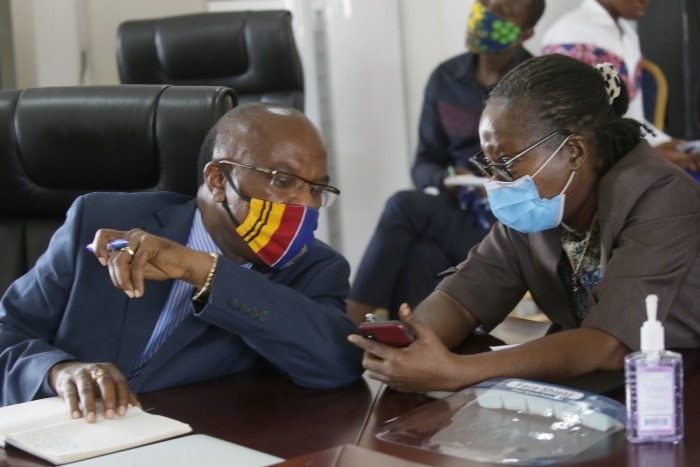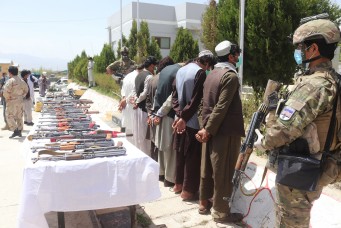Neither East Nor West
As the Covid-19 response of powerful states like the U.S. and China falters, it is also failing regions on the margins of great power politics, like Africa. It is time weaker states take a long look at their dependence on the world’s juggernauts for their own security.

Liberia’s Chief Medical Officer, Dr. Francis N. Karteh (L) and Health Minister, Dr.Wilhelmina Jallah (R) chat during a press briefing on COVID-19 at the Ministry of Health Conference hall in Monrovia, Liberia, 20 April 2020. EPA-EFE/AHMED JALLANZO
The first reports of the breakout of a respiratory disease in China were not about the struggles of ordinary Chinese people. They were stories of unilateral action by the central state, of whistleblowers being silenced, and of the doctors who raised the alarm dying from the disease they were trying to contain. The first public reactions to a possible outbreak in the United States from the White House were not of strategies to help combat the disease, but claims that the illness was a hoax, followed quickly by racist accusations against Chinese people in the United States. Similarly in the UK, a one-week lag between the outbreak of COVID-19 in Italy that should have allowed for more strategic thinking, instead resulted in a dangerous decision to ignore advice from the World Health Organization (WHO) and other European countries, and to focus on mitigation rather than containment.
How does a local outbreak of a disease become a global pandemic? The short answer is politics. More specifically, the politics of an international order in which too many countries believe their own mythologies about power and control, and where international cooperation and solidarity has been reduced to a zero-sum game. The situations in China, the UK and the United States are united by a common thread—powerful countries that position themselves as global leaders acting with such near-sighted, dogmatic commitment to their political ideology that they fail to respond adequately and in a coordinated way to a global threat. This pattern replicates itself to a smaller extent in various regions around the globe, leaving many people in the world exposed to unnecessary risk—particularly in regions like Africa.
In March 2020, China was praised in many quarters for having taken the drastic measures needed to rein in the COVID-19 outbreak a month earlier. But these reports overlooked that China was aware of an outbreak by at least the end of December 2019. Dr. Li Wenliang first raised alarms about a mysterious respiratory illness in Wuhan in early December, but instead of being listened to, was detained and forced to sign a document admitting that he had “seriously disrupted the social order”. A week later, he fell ill and eventually died of COVID-19 in February. In the interim, the Chinese government spent a significant amount of diplomatic energy, particularly in Africa, urging countries not to cancel travel connections with China and downplaying the impact of the disease in Wuhan. By the end of March, the official death rate in China was around 3,300, although there are credible reasons to believe that the real number is higher.
In the UK, by the time Prime Minister Boris Johnson announced the government’s plan to respond to the disease, Italy had already implemented a nationwide shutdown, and the WHO had already declared the virus a pandemic. But instead of following official WHO guidance on managing the disease, Johnson announced a plan for “mitigation,” essentially allowing the disease to run unchecked for several crucial days. On March 12, Johnson announced that “families are going to lose their loved ones before their time,” but that the UK government would not take any extraordinary measures to contain the outbreak. Four days later, he was forced to recant and take harsher measures. By April 11, 8,974 people were dead in the UK and the number was still rising (with Johnson himself among the critically ill).
Meanwhile, in the United States, an administration governed by a disbelief in science fueled dangerous denial among its acolytes, who acted irresponsibly toward themselves and others. President Donald Trump first denounced COVID-19 as a hoax, then collapsed onto racist tropes, blaming China and Chinese people for the virus, until finally acknowledging the threat of the disease in mid-March. By the time U.S. citizens were advised to wear masks in public beginning April 4, 7,392 people had died, and Los Angeles and New York City, two of the largest cities in the United States, were under lockdown.
Our geopolitics have failed
COVID-19 is by many measures the most complex global political challenge in contemporary history. In addition to the death and suffering it has caused, the illness has piggybacked perfectly onto the idiosyncrasies of contemporary politics, compounding the damage and establishing itself as a formidable challenge to so many of the presumptions on which modern lives are based. Countries with the best public health systems on paper are buckling and inching toward collapse. The poorest parts of the world are so far watching in alarm but have broadly been spared the worst of the outbreak. And the idea of a global community coming together at a time of need has been significantly undermined by petty nationalism, confusion and lack of coordination at multiple levels, with poor countries mostly abandoned to their own devices. COVID-19 has been the unmaking of modern international relations.
This pandemic is fundamentally different from the flagship crises of the 20th and 21st centuries in some key ways, and governments are clearly struggling to develop appropriate metaphors and approaches to handle it. Significantly, the politics of the modern era have been defined by war—both practically and metaphorically—and war metaphors dominate the reactions to COVID-19, even though they are proving to be insufficient and, in fact, counterproductive. Appeals to nationalism and strong borders, rousing rhetoric about coming together to defeat the enemy, and calls to arms that effectively amount to “stay at home and do nothing” sound hollow and out of sync when the enemy is neither in uniform nor particularly moved by rhetoric.
Instead, much of the international response has been characterized by a hoarding of supplies and information, to the detriment of mounting a coordinated response. When the enemy is so small that it does not even count as a living organism, countries are floundering and it is unclear if the systems built over the last one hundred or so years are equal to the task of collective survival. Even as the disease rages on, the geopolitics of great power contests continue to shape the international response. Taiwan, which perhaps has had the most success at controlling the disease, is largely shut out of international policy platforms because of its politics with China. The United States has refused to reduce sanctions against Iran despite the widespread deaths caused by the illness. And the countries that lay claim to the title of great power have put the safety of billions of people around the world at risk by shunning collective, coordinated action in favor of inward-looking, protectionist policy.
Where does this leave Africa?
For Africa, COVID-19 is a critical reminder of just how peripheral the continent is in the current geopolitical framework. When the outbreak first went international, there was some talk about Africans being immune given how few cases were reported here. But what later emerged was a continent broadly disconnected from global travel, and the probability of infected persons traveling to Africa was simply lower. Once cases in Europe—by far the continent most connected to Africa—started to spike, cases in Africa also started to increase. Now countries that spent weeks watching instead of preparing are facing their biggest health crises since the HIV/AIDS pandemic of the 1990s.
At the same time, the collapse into nationalism and self-preservation in other countries is a jolting reminder that African governments are far too dependent on the benevolence of other regions, plus the secondary benefits of containment progressing well elsewhere. In international relations (IR) theory, the cornerstone of great power politics is that smaller nations reap the indirect benefits of a great power that can mobilize political, economic and social resources. Thus, a strong U.S. military can be justified from an IR perspective through its capacity to provide protection and intervention in countries like Somalia when the government is aligned with the United States. Of course, there is also a significant measure of risk, in that two great powers squabbling can lead to proxy wars in other parts of the world (as in Africa during World War II and the Cold War). In countries like Ethiopia, the Democratic Republic of Congo and even South Africa, the Cold War was very much a hot one with heavy military and civilian casualties spent for the sake of international powers.
In terms of public health, it is well established that high levels of immunity in one part of the world do have positive benefits in others. This is one of the principles behind mass immunization campaigns—that if a threshold number of people is vaccinated against a disease, there does not have to be mass vaccination; other people will derive secondary benefits from that collective immunity. This is the principle of herd immunity that influenced the UK’s initial approach to COVID-19. But experts have quickly pointed out that herd immunity only works if the entire world is working toward the same goal, and crucially, if a vaccine exists. Without any kind of medical intervention to stop or slow down a disease, it simply means that the disease will kill many people while we await a vaccine.
An external reading of Africa’s response to COVID-19 suggests that, except perhaps for Nigeria, which activated its Centre for Disease Control very early in the pandemic and began localized responses to the disease, countries were hoping to benefit from some form of herd immunity in other parts of the world. Rather than take proactive measures to manage international travel and activate public awareness campaigns early, most countries waited for cues first from China and then from the West. There is a level of complacency embedded in this—the idea that other countries will get this thing under control so that we do not have to—that speaks to the dependence that the current international order creates. Weaker countries are so accustomed to great powers having their politics in order that they fail to take measures to manage their own domestic challenges, such that when the outbreak happens, their response muscles have atrophied so much that responses are weak and inadequate.
In countries like Kenya and Zimbabwe, official travel advice was initially shaped by China, which barred citizens from leaving Wuhan and then pushed for flights between China and Kenya to continue. Even when it became clear that almost all the cases in Africa were coming through Europe, there was a delay in barring arrivals from the continent, relying perhaps on European countries to control their own citizens’ exit. African countries were waiting for cues from other parts of the world before formulating policies on entry and exit measures, and of course by the time the policies came it was too little, too late.
Great power politics foster dependency in weaker countries who rely on the quality of leadership in powerful nations for their survival. With the rise of populism and nationalism in other parts of the world, it is clear that this dependency is a major vulnerability for citizens of weaker countries. The UK’s herd immunity model failed to consider what would happen once the disease was exported from the UK to countries with much weaker public health systems. It did not acknowledge that citizens of the UK travel, while in fact the UK has the largest population of citizens living abroad of any European country. Without proposing a ban on international travel for UK citizens alongside the herd immunity model, or measures to support the public health systems of other parts of the world, the UK was essentially telling countries around the world to which UK citizens travel that they were on their own. This is antithetical to the philosophies of global solidarity that theoretically underpin the UK’s aspirations to leadership.
Still, the most striking example of the risks of such dependencies is the United States. Members of Trump’s own administration have publicly criticized the president’s handling of the crisis, not just for leaving the entire country vulnerable, but people further afield as well. An investigation by the Washington Post revealed that the administration knew about the COVID-19 threat but took seventy days to respond, in part because Trump essentially eliminated the pandemic response structure that the Obama administration created after the SARS outbreak of 2012. This had knock-on effects for exposure to other countries around the world. For example, the Kenyan pilot who flew the last flight from New York to Nairobi before the government closed Kenyan airspace died of COVID-19, presumably having caught the disease in New York.
The way forward is self-reliance
For Africa, the unchecked arrival of travelers from all of these countries and other parts of Europe has introduced a disease that, at least based on the availability of facilities, not a single country on the continent can handle. Experience from other countries shows that a significant number of COVID-19 cases are critical, and critical cases need treatment in an Intensive Care Unit (ICU) to survive. In 2012, Italy had 12.5 ICU beds for every 100,000 people, and has been overwhelmed by the disease. Kenya, for example, has an estimated 518 ICU beds with ventilators in the entire country of 47 million people, and would certainly be quickly overwhelmed by an outbreak. Uganda has more ministers than ICU beds—31 cabinet ministers, 49 ministers of state, and only 55 ICU beds.
Should African countries have beefed up their local capacity earlier? Certainly, these are failures for which the leaderships of our countries are responsible. Egypt and South Africa, two of the largest economies on the continent, have already entered a phase of community transmission, with other countries like Kenya and Nigeria preparing for an uptick in cases over the next few days. But a truly international mindset should also have pushed countries with better facilities to show leadership and contain the outbreak within their own borders earlier. This is the leadership that great power politics promise, and this disease has demonstrated that it is hollow, given that each pretender to the throne quickly collapses to self-interested, inward looking ideological action at the expense of the weaker countries in the world.
In fact, COVID-19 is a great moment to stop and ask if it is time to end great power politics altogether. These politics have always been dangerous. Proxy wars have destabilized entire continents. Great power politics are premised on competition, and challenges like COVID-19 require generosity and collaboration, values that militaristic positioning undermines. A national ethos focused on appearing strong rather than being strong is inherently vulnerable to threats that cannot be defeated by military or political strength. When countries are dependent on the internal politics of other countries for their very survival, they are unduly subject to the vagaries of ideological contests over which they have absolutely no control.
Seamus Heaney’s introduction to Beowulf captures the futility of great power politics perfectly: “Little nations are grouped around their lord, the greater nations spoil for war and menace the little ones, a lord dies, defenselessness ensues, the enemy strikes, vengeance for the dead becomes an ethic for living, bloodshed begets further bloodshed, the wheel turns, the generations tread and tread and tread.” African countries are unnecessarily vulnerable because they failed to invest in their national healthcare systems, because they waited to see how more powerful nations would react rather than take proactive measures, and because they did not realize how little internal ideology within these greater powers has the survival of Africa in mind. Leaders on the continent sleepwalked into a catastrophe.
In many other areas, such as managing national healthcare systems and building just economies, COVID-19 is inviting the world to imagine a different way of working. For African nations, so unnecessarily dependent on either China or the West, this is a time to stop and re-evaluate, perhaps drawing from the late Ghanian President Kwame Nkurumah’s exhortation to face neither East nor West, but forward.
Nanjala Nyabola is a writer and political analyst based in Nairobi, Kenya. She is the author of the forthcoming Digital Democracy, Analogue Politics and a co-editor of Where Women Are: Gender and the 2017 Kenyan Election. Her articles have appeared in Foreign Policy, New Internationalist, Al-Jazeera, and Project Syndicate, among others. On Twitter: @Nanjala1.
Read More



